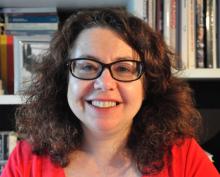Giulia Pesaro [email protected], [email protected]
Senior Independent Researcher, University Professor, and Senior Consultant.
Economist and PhD in Public Policies and Territorial Planning
Founder and Senior Partner of Cooperate Srl since 2004
Professor and Senior Researcher at Politecnico di Milano since 2000
Professor at Università degli studi dell’Insubria since 2012
Qualified as associated professor in the National Concourse in sector 08 / F1 (Urban and Territorial Planning and Design) in February 2014
Project Manager of the EU funded project CHEERS "Cultural HEritagE. Risks and Securing activities" (Interreg ALPINE SPACE 2018-2021) on behalf of Fondazione Lombardia per l'Ambiente
Founder and member of the board of the association REsilienceLAB since 2014
Member of the scientific associations AISRE and ERSA since 2002
External Expert for the evaluation of COST European Funded Projects since 2018
Member of the Scientific and Operational Committee of the “Osservatorio delle Pratiche di Resilienza” (Observatory for Resilience Practices) of Fondazione Cariplo 2015-2017
Member of the Scientific Committee of the SBE19 Conference “Resilient Built Environment for Sustainable Mediterranean Countries”
Member ot the Scientific Committee of the forthcoming Conference “Alpine Landscape Meets Culture, Cultural Heritage and Landscape for a new Alpine tourism – ALMCC2020”
Designer and coordinator of research and operational projects at local, national and international level for public and private bodies. The main target fields are the promotion of resilience and sustainable development of territorial systems and the prevention and mitigation of risk and damage due to natural hazards impacts. Great attention is also paid to green economy and the whole of the so-called new economies based on sharing and collaborative approaches. Other thematic issues are related to the sustainability, smartness and resilience of local territorial systems, with particular attention to the protection and valorisation of public goods like the cultural heritage, cultural landscape and natural environment. Great attention is also paid to territorial and economic analysis of urban and rural systems and the related resources, in order to develop evaluation methodologies and tools, policies and strategic projects for a more balanced, sustainable and resilient territorial development.
Consultant in strategic planning, projects design and implementation, analysis of case studies, development of best practices and action tools, communication and knowledge diffusion, innovative tools for policy makers, stakeholders and communities active involvement in enhancing and facilitating decision-making processes. The main fields of activity are sustainable development, protection and valorisation the cultural heritage and the natural environment, the economic resilience of territorial systems, damage prevention and mitigation and tools for disaster risk reduction, natural hazards and climate change sectors. Other activities concerned, over time: territorial systems analysis and resource assessment, practices and tools for sustainable governance and management of cultural heritage, landscape and natural environment, practices and tools for supporting decision making at the local and regional level, sustainable development practices in urban and rural areas. The territorial scale is mainly from local to regional level, the toolbox mainly relates to economic based, strategic planning, knowledge building, communication and diffusion.
Project Manager, Work Packages Coordinator and Senior Research Fellow in European Projects since 2003 in programs INTERREG IIIB, IVB and 2018-2021 Alpine Space, Horizon 2020, DG ECHO, ERASMUS+ , FP7
Director of a range of projects at regional, national and European level and on behalf of both public and private institutions: Italian Ministry of the Environment; Italian Ministry for Cultural Heritage and Tourism (Lombardy Region Museums Pole); CNEL; ENEA; Lombardy Region; Veneto Region; Emilia Romagna Regional Environmental Agency (ARPA); Lombardy Foundation for the Environment; Friends of the Earth Italy; IReR Lombardia; EUPOLIS; IRS Institute; Fondazione Cariplo; Fondazione Politecnico; DAStU Politecnico di Milano; Italian Provinces; Italian Mountain Communities; Italian and European Municipalities; Italian and French industrial associations and firms; NGOs
University and Post-Graduate Professor at national and international level from 2002: First University degree courses, Master of Science courses, Post Graduate University courses and other high level Specialization courses and workshops. Courses main themes: methodologies and tools for territorial analysis, the economic approach to natural hazard damage prevention and mitigation, resilience theory and practice, industrial economics, macroeconomics, environmental and economic assessment of urban and architecture projects and plans, environmental economics, new economies, sustainable development theory and practice, strategic planning for the protection and valorisation of the cultural heritage.
Scientific and operational coordinator of workshops and conferences at national and EU level.
Experience in the design of e-learning tools and courses: architecture, selection of the contents, design of specific documents and learning activities for e-learning sites.
Experience in the design of videos and other multimedia products for: communication and diffusion of sustainable development and resilience practices; institutional communication for the protection and valorisation of cultural heritage, landscape and natural environment and for better promoting the values of resilience enhancement of local communities and their environments.
Experience in the design and leading of tools for promoting and improving stakeholder participation and active involvement in policy design and decision-making, like living labs, workshops, storytelling, role games, etc.

